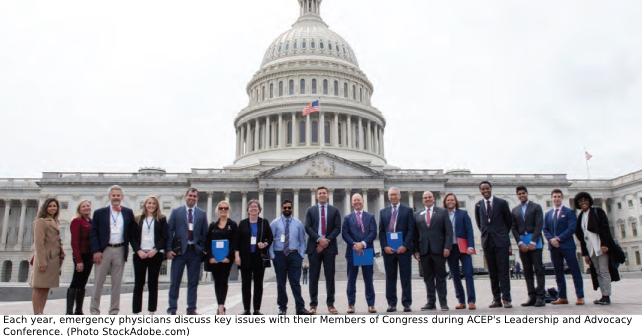
Emergency physician-supported solutions to some of the biggest challenges in health care are gaining steam in Washington, D.C.
Explore This Issue
ACEP Now: Vol 43 – No 03 – March 2024In December, the Department of Health and Human Services (HHS) announced it would convene stakeholders to address boarding concerns through the Agency for Healthcare Research and Quality (AHRQ). ACEP conversations continue with teh AHRQ.
ACEP helped make this possible by mobilizing Congress to request HHS action during last year’s Leadership and Advocacy Conference, where emergency physicians from across the country gathered in D.C. to share their concerns directly with elected officials. ACEP advocates helped secure 44 signatories on a congressional “Dear Colleague” letter to the Administration, asking them to establish a task force on the boarding crisis.
The College is pushing for federal actions that align with input from the first National Stakeholder Summit on Boarding, which ACEP organized and hosted in September 2023.
In addition to boarding measures, ACEP strongly supports legislation to improve protections for the health and safety of emergency physicians on the job.
ACEP and the American Hospital Association co-hosted a congressional briefing Jan. 30 to discuss violence in the emergency department and encourage elected officials to pass the SAVE Act, bipartisan legislation that ACEP helped develop and strongly supports to protect physicians and health care professionals in the workplace.
This bill would make assaulting a health care worker a federal crime and create grants to empower emergency departments to enact solutions that work best for their community, while ensuring critical protections for patients in mental health crisis or who may be limited in capacity.
The expert panel included ACEP President Aisha Terry, MD, MPH, FACEP, alongside Kate FitzPatrick, DNP, RN, NEA-BC, FAAN, chief nurse executive officer at Jefferson Health Philadelphia, and Mark Boucot, president and chief executive officer at Garrett Regional Medical Center in Oakland, Maryland. The panel was joined by SAVE Act co-sponsors, Rep. Larry Bucshon, MD (R-IN) and Rep. Madeline Dean (D-PA).
“We can’t be the safety net without feeling safe ourselves,” Dr. Terry said at the briefing. “This is not a one-off. This is a daily situation in emergency departments across the country.”
The panel emphasized the importance of accountability as a mechanism to prevent future attacks, and reiterated the need to change the culture of medicine, which too often allows these incidents to go unreported and unaddressed.
The sentiment is consistent with 2022 ACEP polling that shows the rise of violence and the impact these attacks have on patient care and physician mental health.
ACEP is reminding legislators and health care leaders that efforts to curb violence are still urgently needed today—this is not just a pandemic problem, but a persistent and growing one.
A January 2024 ACEP member survey with about 2,000 responses revealed that 71 percent of emergency physicians believe violence in the emergency department is worse than last year. Nine in 10 respondents (91 percent) indicated that they or a colleague were threatened or attacked in the past year, and more than two-thirds (68 percent) of those physicians said that they felt their employer’s response was not appropriate. The survey also yielded more than 800 distressing firsthand accounts from members across the country.
Dr. Terry used her platform at the briefing to reference impactful ACEP state chapter efforts, including a recent Virginia College of Emergency Physicians-led effort to pass a law requiring trained security at emergency departments throughout the state, as well as an ACEP checklist developed so that anyone can speak to their hospital leadership about programs, plans, and features that make emergency departments safe.
ACEP is tackling this issue from every direction to make sure that emergency physicians are heard loud and clear: the status quo is unacceptable and now is the time for change.
ACEP also works to protect emergency physicians by shepherding support for the reauthorization of the Dr. Lorna Breen Health Care Provider Protection Act, legislation named to honor the life and legacy of the longtime ACEP member who died by suicide in April 2020.
ACEP and a coalition of nearly 60 health care organizations wrote:
Because of the Dr. Lorna Breen Health Care Provider Protection Act, lives have been saved and livelihoods have been protected. Access to mental and behavioral health support and treatment has improved and more employers are able to engage with their workforce on these issues, provide greater resources, and accelerate promising solutions.
We must continue working to ensure an environment where each and every health care professional always has access to the necessary mental health care services they need and deserve, without fear of loss of licensure, loss of income, or other meaningful career setbacks associated with the stigma of getting the help they need.
To date, the law that bears Dr. Breen’s name has enabled the distribution of more than $100 million to 44 organizations to improve access to mental health services and resources for physicians and health care providers across the nation. Reauthorization ensures continued support for health care workers’ well-being.
Efforts to support emergency physicians’ most vulnerable patients are also a priority. ACEP is working in a bipartisan fashion to support the reauthorization of funds for the Emergency Medical Services for Children (EMSC) program.
EMSC is the only federal initiative focused on pediatric emergency services and ACEP wants to make sure that the program continues to support the use of child-appropriate medication, supplies and equipment, advances pediatric training and protocols, and expands opportunities for pediatric emergency care research.
ACEP members can identify opportunities to speak out to local officials and stay current on all of ACEP advocacy efforts through the ACEP Advocacy Action Center at acep.org/ActionCenter.
Mr. Arnoff is a Senior Communications Manager at ACEP.
Pages: 1 2 3 | Multi-Page





No Responses to “ACEP Advances Boarding Solutions”